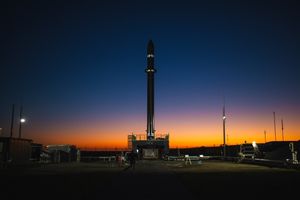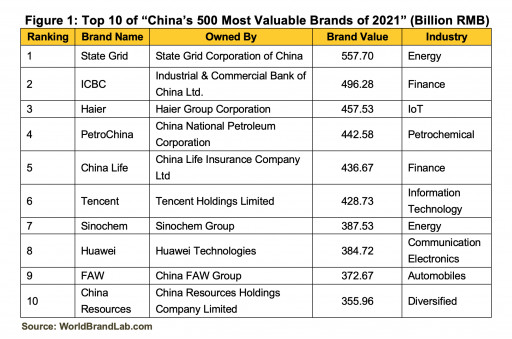World Brand Lab Releases 'China's 500 Most Valuable Brands of 2021'
NEW YORK - June 21, 2021 - (Newswire.com)
The 2021 "China's 500 Most Valuable Brands" list (18th edition), exclusively compiled by World Brand Lab, was released on June 22 in Beijing. This year State Grid, with a brand value of 557.70 billion RMB, topped the annual list, which weighs financial data, brand strength, and consumer behavior. Joining State Grid in the top five were Industrial and Commercial Bank of China (496.28 billion RMB), Haier (457.53 billion RMB), PetroChina (442.56 billion RMB), and China Life (436.67 billion RMB). These companies have become world-class brands. Management gurus from Harvard, Yale, and Oxford attended the World Brand Summit and gave online speeches, during which they discussed with guests how sustainable brands drive corporate growth.
The total value of China's 500 Most Valuable Brands reached 27,895.32 billion RMB in 2021, up 12.97% since last year. Steve Woolgar, Chairman of the Academic Committee of World Brand Lab and Professor of Marketing Emeritus at the University of Oxford, said, "Brands are the image of a country. I hope that more people around the world can learn about China's stories through Chinese brands. In the past 15 years, I have witnessed the rapid growth of Chinese brands, some of which already have strong global influence. These brands include State Grid, China Life, Haier, Beidahuang, Wuliangye, Tsingtao Brewery, Double Star Group, Zhuyeqing Tea, HBIS Group, Hengli, China Southern Power Grid, XCMG, Snow Beer, JOMOO, Air China, China FAW, and China Resources."
This is the 18th year that World Brand Lab has compiled a Chinese brand report. The entry threshold in 2004 was only 500 million RMB, and the top 500 brands held an average value of 4.94 billion RMB. In contrast, the entry threshold was 3.07 billion RMB in 2021, with an average value of 55.79 billion RMB, an increase of 1028.69%. According to analysis performed by World Brand Lab, the competitive strength of a region depends mainly on its comparative advantages, which are directly affected by brand benefits. Of China's "500 Most Valuable Brands" this year, 91 are based in Beijing. Guangdong and Shandong have the second and third greatest number of brands on the list, with 86 and 44 brands, respectively. The listed brands can be categorized as national or global according to their scope of influence. There are 439 brands of national influence on the list, accounting for 87.80% of the total, and 61 (12.20%) of global influence, a slight increase from last year.
Although the pandemic did not halt the overall upward trend of Chinese brand value, the number of brands in industries such as automobiles, travel services, and media dropped significantly compared with last year, while the numbers in industries with inelastic demand such as food and beverage, finance, and agriculture, increased. The "2021 China's 500 Most Valuable Brands" list contains brands from 26 industries, among them food and beverage, light industry, building materials, media, textiles and clothing, medicine, and machinery. The food and beverage industry remains the sector with the most brands on the list, counting 87 and representing 17.40% of the list. The second- to fifth-ranking sectors are light industry (52), building materials (37), media (33), textiles and clothing (33), and communication and IT (30). A total of 57 Chinese brands were valued at more than 100 billion RMB this year, up from 53 last year.
The theme of this year's World Brand Summit was "Sustainable Brands Drive Corporate Growth." According to a joint study by World Brand Lab and Superfinance, brand value and environmental, social, and governance (ESG) scores are positively related. Dr. Karthik Ramanna, a professor of business and public policy at the University of Oxford, pointed out that in many companies, dealing with ESG factors is seen as a reporting or compliance exercise rather than a strategic activity. He outlined five steps that enable brands to build authentic trust with customers. First, companies should not ignore stakeholder issues. Second, they should try to avoid political issues. Third, they should act on capacity asymmetries. Fourth, they should stay ahead of the curve.
John Deighton, a professor of Business Administration Emeritus at Harvard University, offered advice on how to implement a sustainable branding strategy, emphasizing the need for less marketing and more market-making. After examining two industries, textiles and food, Deighton realized that companies are wasting more than they consume. A product that fails to sell is an insignificant expense for a brand but an enormous problem for the planet. The solution that Professor Deighton offered is to open new markets, creating an appetite for recycled clothing, patchwork fabrics, less-than-perfect fruit, etc., to reduce the impact on brand reputation.
Ravi Dhar, professor of marketing at the Yale School of Management, stated that stakeholder marketing strategies are quietly changing. Dhar put forward a four-step strategic value creation process: First, identify the value drivers for different stakeholder categories. Second, distinguish "must do" tasks that are required for compliance with laws or industry norms from "choose to do" opportunities that create lasting competitive differentiation. Third, companies must try to jointly solve problems that concern not just one stakeholder category but stakeholders at all business levels. Finally, companies should enable new systems and metrics to measure the impact and outcomes of their strategies.
Adi Ignatius, editor-in-chief of Harvard Business Review, noted that the role of the CEO is changing. Executive leaders now feel the need to think broadly about all their stakeholders, not just their shareholders. As such, the CEO position is becoming more rewarding but also more complex. Even as the role evolves, however, the fundamental attributes of great leaders remain the same. Mr. Ignatius singled out four CEOs as leaders who created brands of lasting value: Ed Catmull of Pixar, Steve Jobs of Apple, Indra Nooyi of PepsiCo, and Zhang Ruimin of Haier.
Haisen Ding, founder and CEO of World Executive Group and World Brand Lab, said, "Brands have a direct impact on both the sales performance and capital market valuation. In the last 20 years, one of the most important features of global capital markets is that brand-centered intangible assets have surpassed tangible assets in terms of importance. From 1975 to 2018, intangible assets as a percentage of market capitalization for all companies in the S&P 500 increased from 17% (12.00 billion USD) to 84% (21.03 trillion USD). The sustainable growth of the Chinese economy is closely linked to the growth in Chinese brands. Brands influence production and consumption, and ultimately contribute to economic growth."
William Mundell, Vice Chairman of the Advisory Committee of World Brand Lab, added, "Brand awareness reflects, to a certain extent, national character and national spirit. Brand sustainability should benefit everyone involved at all business levels."
World Brand Lab is an international brand value research institute, wholly owned by World Executive Group, the world's leading digital business and strategy consulting firm. World Brand Lab was founded on the initiative of Nobel Laureate Robert Mundell, who served as its first chairman. The experts and consultants of World Brand Lab come from Harvard, Yale, MIT, Oxford, Cambridge, and other top universities around the world. Its research results have become an important basis for intangible asset valuation in the M&A process for many enterprises.
Press Release Service by Newswire.com
Original Source: World Brand Lab Releases 'China's 500 Most Valuable Brands of 2021'
More News
View More




Recent Quotes
View More
Quotes delayed at least 20 minutes.
By accessing this page, you agree to the Privacy Policy and Terms Of Service.
